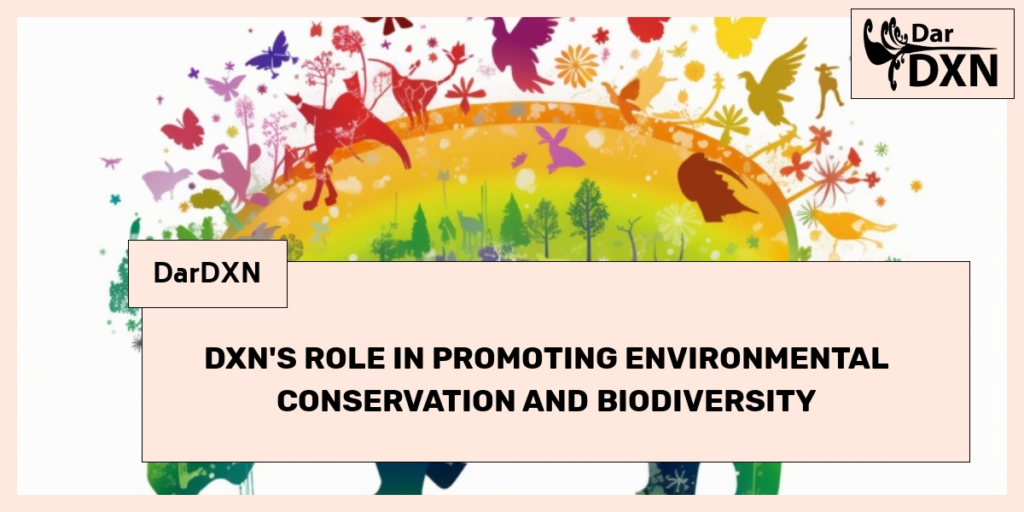DXN, a multinational company that specializes in the cultivation and distribution of health supplements, has been making strides towards promoting environmental conservation and biodiversity.
The company recognizes the importance of preserving our planet’s natural resources for future generations to come. DXN is committed to reducing their carbon footprint by implementing eco-friendly practices in all aspects of their operations, including sustainable sourcing of raw materials and use of renewable energy sources.
Moreover, DXN understands the significance of biodiversity in maintaining ecological balance. They have implemented various initiatives aimed at protecting endangered species and conserving habitats.
Additionally, they have developed partnerships with local communities to promote sustainable farming practices that support soil fertility and reduce harmful agricultural practices’ impact on ecosystems.
In this article, we will explore DXN’s role in promoting environmental conservation and biodiversity through its innovative approaches towards sustainability. We will also examine some successful projects undertaken by the company that demonstrate its commitment to these vital causes.
The Importance Of Environmental Conservation And Biodiversity
The earth is home to millions of species, each playing a unique role in maintaining the balance of our planet’s ecosystems. Biodiversity, or the variety of life on Earth, is essential for providing clean air and water, food security, medicine, and other vital ecosystem services that support human well-being.
Unfortunately, due to factors such as habitat destruction, climate change, pollution and overexploitation of natural resources, biodiversity loss has become a critical global issue.
Businesses have an important role to play in conserving biodiversity and promoting sustainable practices. By committing to environmental protection measures such as reducing greenhouse gas emissions, minimizing waste production and supporting conservation initiatives like reforestation programs or wildlife sanctuaries; companies can help mitigate their negative impact on ecosystems while positively contributing towards preserving biodiversity.
Furthermore, businesses can also incorporate sustainability into their core values by adopting eco-friendly products and processes that promote resource efficiency and reduce ecological footprints. Such actions not only demonstrate responsible corporate citizenship but also align with consumer demands for ethical business practices that prioritize social responsibility alongside profitability.
As DXN continues to grow its presence globally across various industries ranging from healthcare supplements to coffee products via agriculture operations – it recognizes the importance of safeguarding biodiversity through conscious choices that minimize harm to nature’s delicate balance while fostering growth opportunities for generations to come.
In this next section, we will explore how DXN commits itself towards sustainability through impactful initiatives aimed at enhancing socio-environmental wellbeing worldwide.
Dxn’s Commitment To Sustainability
DXN is committed to sustainability practices and corporate responsibility initiatives that aim to promote environmental conservation and biodiversity. As a company, we recognize the importance of protecting our planet’s natural resources for future generations.
Our commitment to sustainability can be seen in various areas of our operations, including manufacturing processes, packaging materials, waste management systems, and energy consumption. One example of our sustainability practice is the use of renewable energy sources such as solar power in our facilities. We also prioritize reducing greenhouse gas emissions by implementing efficient transportation methods and using eco-friendly vehicles for product delivery.
Furthermore, DXN supports reforestation efforts through tree-planting projects around the world. These initiatives contribute to the preservation of ecosystems and help combat climate change while promoting biodiversity. In line with our commitment to sustainability practices and corporate responsibility initiatives, DXN ensures sustainable sourcing of raw materials.
This includes establishing relationships with farmers who practice organic farming techniques and avoiding harmful chemicals that could harm the environment or impact local communities negatively. Through this approach, we support farmers’ livelihoods while preserving soil health and maintaining biodiversity in agricultural lands. By prioritizing sustainable sourcing practices along with other environmentally conscious measures, DXN strives towards a greener future for all.
Sustainable Sourcing Of Raw Materials
Collaborative initiatives are a key component in achieving sustainable sourcing of raw materials. At DXN, we work closely with local communities and farmers to ensure that our products are sourced from eco-friendly practices. By establishing long-term partnerships with these stakeholders, we can promote responsible land use and reduce the impact on natural ecosystems.
We believe that environmental conservation goes hand-in-hand with economic development. By providing fair prices for sustainably-sourced raw materials, we empower local communities to invest in their own future while preserving their environment. Our commitment to sustainable sourcing also extends beyond our immediate supply chain – we actively engage with industry peers and policymakers to advocate for more environmentally conscious business practices across all sectors.
As part of our ongoing efforts towards sustainability, DXN has implemented various eco-friendly practices throughout our operations. For example, we prioritize using recyclable packaging materials and reducing waste production by implementing efficient manufacturing processes. We constantly challenge ourselves to find new ways to minimize our environmental footprint without compromising product quality or customer satisfaction.
Our commitment to sustainable sourcing is just one aspect of DXN’s broader mission towards promoting biodiversity and ecological conservation.
In the next section, we will explore how we harness renewable energy sources as another step towards this goal.
Use Of Renewable Energy Sources
Solar energy has the potential to provide a clean, renewable source of energy to power homes and businesses worldwide.
By investing in solar energy, dxn can help reduce the global carbon footprint and promote environmental conservation and biodiversity.
Wind power is another renewable energy source that dxn can promote, which can reduce greenhouse gas emissions and provide large-scale electricity generation with minimal environmental impact.
Hydropower is a reliable form of renewable energy that dxn can use to generate electricity and reduce air and water pollution, while also promoting biodiversity in the areas where it is used.
Solar
Harnessing solar energy is a crucial component of promoting environmental conservation and biodiversity.
Solar panels are a prime example of green energy technology that offers numerous benefits, both for the environment and society as a whole.
By utilizing the sun’s rays to generate electricity, we reduce our reliance on fossil fuels and decrease harmful greenhouse gas emissions.
Furthermore, solar power can be harnessed in remote areas where traditional sources of energy may not be available or practical.
Through the use of innovative technologies like solar panels, dxn is committed to promoting sustainable practices that protect our planet while meeting our energy needs.
Wind
Another renewable energy source that offers great potential for promoting environmental conservation and biodiversity is wind.
Wind energy technology utilizes the power of the wind to generate electricity, reducing our reliance on fossil fuels and decreasing harmful greenhouse gas emissions.
However, despite its numerous benefits, wind power generation challenges exist, such as intermittency issues and concerns regarding wildlife impacts.
Despite these challenges, dxn remains committed to exploring innovative solutions in harnessing wind energy technology while ensuring minimal impact on the environment and wildlife.
Through utilizing a combination of renewable energy sources like solar and wind power technologies, we can promote sustainable practices that protect our planet while meeting our energy needs.
Hydropower
In addition to wind energy, hydropower is another renewable energy source that offers many benefits for promoting environmental conservation and biodiversity.
Hydropower technology harnesses the power of flowing water to generate electricity, reducing our reliance on fossil fuels and decreasing harmful greenhouse gas emissions.
The benefits of hydropower include its reliability as a constant source of energy and its ability to store excess energy in reservoirs for later use.
However, there are also potential drawbacks associated with hydropower, such as the displacement of communities near dam sites and negative impacts on aquatic ecosystems.
Despite these challenges, it is important for dxn to continue exploring innovative solutions in utilizing hydropower technology while ensuring minimal impact on both people and the environment.
By incorporating a combination of renewable energy sources like wind, solar, and hydro technologies into our energy mix, we can work towards sustainable practices that protect our planet while meeting our growing energy needs.
Protecting Endangered Species
With the increasing concern for our environment, businesses have been urged to take part in conservation efforts. DXN is one of those companies that strive to promote environmental sustainability and biodiversity. In line with this goal, they utilize renewable energy sources as an alternative means of powering their operations.
However, promoting environmental conservation does not stop at using renewable energy. DXN recognizes the importance of wildlife protection and has taken measures to ensure that their business practices do not harm or disturb any endangered species. They are committed to preserving habitats and ecosystems where these animals thrive by implementing sustainable practices such as minimizing waste production and reducing carbon emissions.
Trees standing tall amidst a lush green forest
A majestic eagle soaring through clear blue skies
Playful dolphins swimming freely in crystal blue waters
A family of elephants grazing peacefully on vast grasslands
Conserving habitats is imperative in maintaining the balance in nature. DXN understands this need and continues to contribute efforts towards achieving it. By taking proactive steps in protecting endangered species, they demonstrate their commitment to responsible business practices while also ensuring that future generations will still be able to enjoy the beauty of nature.
Conserving Habitats
Habitat restoration is a crucial aspect of environmental conservation and biodiversity.
DXN recognizes the significance of conserving habitats for the welfare of our ecosystem. Habitat restoration involves reviving damaged, degraded or destroyed natural habitats by restoring native plants, animals, fishes and other organisms to their former glory. This process helps in reinstating ecological balance which leads to improved soil health, water quality and air quality.
The habitat restoration projects taken up by DXN are carefully planned and executed with the help of experts who understand various aspects such as species diversity, food chain dynamics and community interactions.
The importance of preserving habitats cannot be overstated especially when it comes to protecting endangered species. Habitat destruction has led to an alarming decrease in population sizes across several animal species worldwide. By undertaking habitat restoration initiatives on a large scale, we can actively participate in preventing further damage to our planet’s ecosystems while also helping endangered species recover from near extinction situations.
Through these efforts, DXN aims to promote sustainable development that benefits both human beings and nature at large thereby creating a harmonious coexistence between them.
As we move forward with our mission towards environmental conservation and biodiversity preservation, partnerships with local communities play a significant role in achieving this goal. These partnerships offer opportunities for knowledge sharing and capacity building among members within local areas thereby supporting meaningful engagement towards conservation efforts at every level possible.
In the subsequent section, we will explore DXN’s collaborative approach with local communities while promoting environmental sustainability through its diverse range of programs offered around the world.
Partnerships With Local Communities
Conserving habitats is just one aspect of dxn’s commitment to environmental conservation and biodiversity. In addition, the company places a strong emphasis on community engagement and local empowerment. This approach recognizes the interconnectedness between natural ecosystems and human communities, as well as the importance of working with local stakeholders in order to achieve sustainable outcomes.
Partnering with local communities has always been central to dxn’s philosophy. By engaging with these groups directly, the company can better understand their needs and priorities when it comes to protecting natural environments. Through this process, dxn seeks to empower local people by providing them with education, training and resources that enable them to take an active role in conserving the land around them.
The following are some examples of how dxn collaborates with communities:
- Providing seedlings for reforestation projects
- Supporting eco-tourism initiatives that benefit both wildlife and humans
- Offering financial incentives for farmers who adopt sustainable agricultural practices
- Conducting educational outreach programs about biodiversity and conservation
- Collaborating with indigenous peoples to preserve traditional knowledge about medicinal plants
Through these activities and others like them, dxn aims not only to protect natural habitats but also to promote economic development within local communities. By empowering people at the grassroots level, dxn believes it can create a more sustainable future for all those who depend upon healthy ecosystems.
In the next section, we will explore how this focus on sustainability extends into promoting sustainable farming practices.
Promoting Sustainable Farming Practices
Organic farming is a growing agricultural practice that leverages natural processes to improve soil health, increase crop yields and reduce pollution.
Agroforestry is a diversified farming system that combines trees, crops and animals on the same land to create a synergistic, resilient and productive agricultural system.
Dxn can play an important role in promoting these sustainable farming practices by increasing awareness of their benefits, investing in research and development of organic and agroforestry farming techniques, and providing incentives for farmers to implement these practices.
Organic Farming
Organic farming is a sustainable agricultural practice that aims to reduce the negative impact of conventional farming methods on the environment.
Organic agriculture avoids using synthetic chemicals and genetically modified organisms, which are known to pollute soil, waterways, and harm wildlife.
By adopting organic practices, farmers can ensure that their crops and livestock are free from harmful chemical residues while promoting biodiversity in their fields.
The benefits of organic farming include improved soil quality, reduced greenhouse gas emissions, increased crop yields over time, and better animal welfare standards.
However, organic farming also presents several challenges for farmers such as higher labor costs due to manual weed control and pest management strategies.
Despite these challenges, dxn recognizes the importance of supporting organic farming initiatives by providing education and training programs for farmers who wish to transition towards more sustainable practices.
Agroforestry
Another sustainable farming practice that dxn supports is agroforestry.
Agroforestry involves the integration of trees, crops, and livestock in a single system to promote ecological balance and productivity.
This method provides several benefits such as improving soil health, reducing erosion, enhancing biodiversity, increasing carbon sequestration, and providing habitats for wildlife.
Additionally, agroforestry can also provide economic benefits by diversifying income streams through multiple products from the same land area.
However, implementing an agroforestry system presents challenges such as initial capital investments, long-term management considerations, and potential conflicts between tree growth and crop yields.
Despite these challenges, dxn recognizes the potential of agroforestry in promoting sustainable agriculture while preserving natural resources for future generations.
Successful Projects Undertaken By Dxn
DXN has undertaken several successful projects in promoting environmental conservation and biodiversity. These projects have had a measurable impact on the environment, and provide case studies for other companies and organizations to follow.
One such project was the establishment of DXN’s Organic Farming Program in 2005. This program aimed to promote sustainable farming practices while emphasizing the importance of conserving biodiversity. As part of this program, DXN established an organic farm that serves as a model for farmers looking to adopt sustainable farming practices. The farm uses natural fertilizers, avoids pesticides, and implements crop rotation techniques.
Another notable project is DXN’s Green Building Initiative. Through this initiative, DXN aims to reduce its carbon footprint by constructing buildings that are environmentally friendly. In addition to using renewable energy sources like solar power, these buildings also incorporate features such as rainwater harvesting systems and green roofs which help conserve water resources and promote biodiversity respectively.
The success of these initiatives can be seen through their measurable impact on the environment, making them excellent examples for others looking to engage in similar efforts. Looking ahead, DXN remains committed to promoting environmental conservation and biodiversity through innovative solutions like those discussed above. Future goals include expanding upon existing initiatives while exploring new ways to reduce our impact on the planet. With continued effort towards sustainability, we hope to inspire change not just within our own organization but throughout society as a whole.
Future Goals And Outlook For Dxn’s Role In Promoting Environmental Conservation And Biodiversity
As DXN continues to prioritize environmental conservation and biodiversity, the company looks forward to implementing new initiatives that will further promote sustainable practices.
Moving forward, DXN aims to strengthen its collaboration opportunities with local communities, governments, and other organizations in order to maximize impact. This includes partnering with experts in the field of biodiversity research and conservation as well as investing in community-based education programs.
Despite these efforts, there are potential challenges that may arise along the way. For instance, climate change can have significant impacts on ecosystems and wildlife populations which may require adaptive management strategies. Additionally, ensuring compliance with relevant regulations and standards can be a complex process that requires ongoing monitoring and evaluation.
However, DXN remains committed to overcoming these obstacles through strategic planning and continuous improvement efforts. By working together towards a common goal of sustainability, we believe that our future outlook for promoting environmental conservation and biodiversity is bright.
Frequently Asked Questions
What Are Some Specific Examples Of Environmental Conservation Projects That Dxn Has Undertaken In The Past?
DXN has successfully implemented several environmental conservation projects that have had a positive impact on biodiversity. These projects are categorized under four main areas: water resource management, reforestation and afforestation, waste management, and energy efficiency.
DXN’s success stories include the restoration of degraded land through tree planting in Indonesia, Malaysia, and Thailand; the installation of solar panels in its factories to reduce carbon emissions; and partnerships with local communities to manage watersheds sustainably.
Impact assessments show that these projects have led to improvements in air quality, soil fertility, and increased wildlife populations. Community involvement is also an essential part of DXN’s approach to environmental conservation as it helps build awareness about sustainable practices among locals.
Examples of such collaborations include training sessions for farmers on sustainable agricultural practices and engagement activities aimed at educating school children on the importance of preserving natural resources. Through these initiatives, DXN continues to play a crucial role in promoting environmental conservation and protecting biodiversity globally.
How Does Dxn Ensure That Its Suppliers Also Prioritize Sustainability And Environmental Conservation?
Collaboration with suppliers is a key component of DXN’s sustainable sourcing practices. The company recognizes that environmental conservation and biodiversity are critical issues facing the world today, and has made a concerted effort to ensure that its suppliers share this commitment.
In order to achieve these goals, DXN works closely with its partners to establish clear sustainability standards and expectations. This includes providing training and support on best practices for environmental management, as well as conducting regular audits to verify compliance.
By prioritizing sustainability throughout its supply chain, DXN is able to not only reduce its impact on the environment but also contribute to global efforts towards conservation and biodiversity preservation.
Has Dxn Faced Any Challenges Or Obstacles In Promoting Environmental Conservation And Biodiversity, And How Have They Addressed Them?
The promotion of environmental conservation and biodiversity is a crucial aspect of any organization’s sustainability efforts. DXN, as an environmentally conscious company, has faced several challenges in promoting these aspects.
One significant challenge that the company encountered was ensuring its suppliers also prioritize sustainability and environmental conservation. To address this issue, DXN implemented strict guidelines for supplier selection that included assessing their commitment to sustainable practices. Additionally, the company provided training and support to help its suppliers align with its values.
Another challenge faced by DXN was raising awareness among employees and customers about the importance of environmental conservation and biodiversity. The company addressed this by launching educational campaigns to educate both groups on the significance of these issues and how they could contribute towards them positively.
These solutions have enabled DXN to promote environmental conservation effectively while maintaining high levels of productivity in all areas of operation.
How Does Dxn Measure The Impact Of Its Sustainability Initiatives And Ensure That They Are Effective In Promoting Environmental Conservation?
As a company that emphasizes sustainable practices, DXN recognizes the importance of measuring the impact of its sustainability initiatives to ensure their effectiveness in promoting environmental conservation.
Impact assessment is crucial in determining how well these initiatives are being implemented and identifying areas for improvement.
To achieve this, DXN utilizes various tools such as carbon footprint assessments and biodiversity impact assessments.
By incorporating these methods into its business operations, DXN can better understand the impact it has on both the environment and society.
Through continued monitoring and evaluation, DXN remains committed to reducing its environmental footprint while supporting biodiversity conservation efforts.
How Does Dxn Involve Its Customers And The Wider Community In Its Efforts To Promote Sustainability And Environmental Conservation?
Collaborative efforts and community engagement play a crucial role in promoting sustainability and environmental conservation.
DXN, as an organization committed to these values, recognizes the importance of involving its customers and the wider community in its efforts towards this goal.
Through various initiatives such as awareness campaigns, educational programs, and volunteering opportunities, DXN seeks to create a culture of environmental consciousness among its stakeholders.
By working together with individuals and organizations alike, DXN aims to foster a sense of shared responsibility for protecting our planet’s biodiversity and preserving it for future generations.
Ultimately, by engaging with the broader community, DXN hopes to inspire positive change at both local and global levels.
Conclusion
DXN, a Malaysia-based company that specializes in the production and distribution of health supplements and personal care products, has taken an active role in promoting environmental conservation and biodiversity. Through various initiatives and programs, DXN has shown its commitment to sustainability while also encouraging others to do the same.
One specific example of DXN’s efforts towards environmental conservation is their partnership with the Malaysian government’s ‘Greening Malaysia’ campaign. As part of this initiative, DXN committed to planting 100,000 trees across Malaysia over a period of five years. The first phase of this project involved planting 20,000 trees in Johor Bahru, which was completed successfully in 2018.
Additionally, DXN has implemented sustainable practices within its own operations such as using renewable energy sources like solar power for its manufacturing facilities.
DXN places great importance on ensuring that its suppliers also prioritize sustainability and environmental conservation. The company conducts regular audits on its supplier chain to ensure compliance with ethical sourcing standards while also providing training sessions for suppliers on issues related to sustainability. Moreover, DXN only works with suppliers who share their values regarding environmental protection.
Despite these efforts by DXN towards sustainability, challenges have arisen along the way including limited resources available for implementing large-scale projects. However, through innovative solutions like partnering with other organizations or collaborating with local communities on grassroots projects, DXN has managed to overcome these obstacles.
DXN measures the impact of its sustainability initiatives regularly and makes necessary changes based on the results obtained from monitoring them. This ensures that they remain effective in promoting environmental conservation whilst achieving business goals simultaneously.
In conclusion, just as plants require water to grow into healthy beings – so does our planet need companies like DXN who are dedicated to conserving it for future generations. By taking practical steps towards protecting biodiversity through tree-planting campaigns and ensuring responsible sourcing practices throughout supply chains; we can all work together towards creating a healthier environment for ourselves and the planet.







